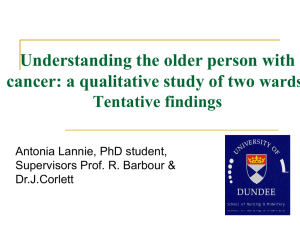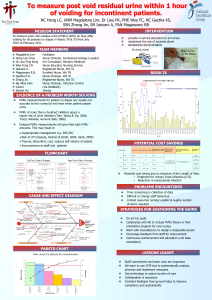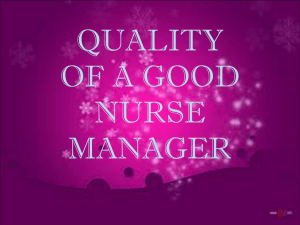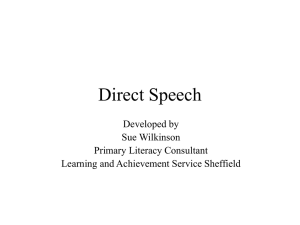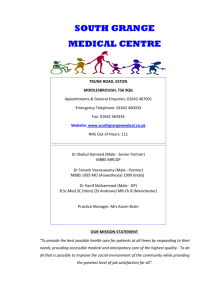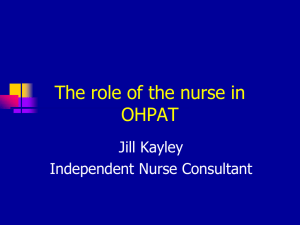Additional File 1
advertisement
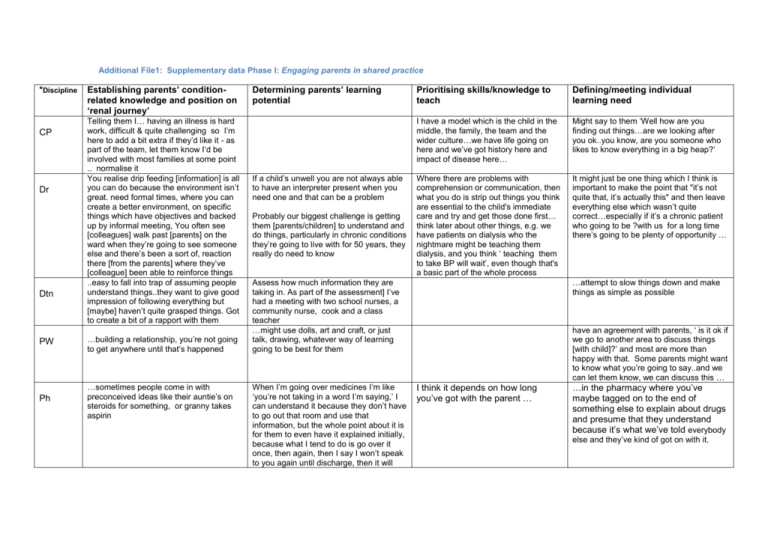
Additional File1: Supplementary data Phase I: Engaging parents in shared practice
*Discipline
CP
Dr
Dtn
Establishing parents’ conditionrelated knowledge and position on
‘renal journey’
Telling them I… having an illness is hard
work, difficult & quite challenging so I’m
here to add a bit extra if they’d like it - as
part of the team, let them know I‘d be
involved with most families at some point
.. normalise it
You realise drip feeding [information] is all
you can do because the environment isn’t
great. need formal times, where you can
create a better environment, on specific
things which have objectives and backed
up by informal meeting, You often see
[colleagues] walk past [parents] on the
ward when they’re going to see someone
else and there’s been a sort of, reaction
there [from the parents] where they’ve
[colleague] been able to reinforce things
..easy to fall into trap of assuming people
understand things..they want to give good
impression of following everything but
[maybe] haven’t quite grasped things. Got
to create a bit of a rapport with them
PW
…building a relationship, you’re not going
to get anywhere until that’s happened
Ph
…sometimes people come in with
preconceived ideas like their auntie’s on
steroids for something, or granny takes
aspirin
Determining parents’ learning
potential
If a child’s unwell you are not always able
to have an interpreter present when you
need one and that can be a problem
Probably our biggest challenge is getting
them [parents/children] to understand and
do things, particularly in chronic conditions
they’re going to live with for 50 years, they
really do need to know
Prioritising skills/knowledge to
teach
Defining/meeting individual
learning need
I have a model which is the child in the
middle, the family, the team and the
wider culture…we have life going on
here and we’ve got history here and
impact of disease here…
Might say to them ‘Well how are you
finding out things…are we looking after
you ok..you know, are you someone who
likes to know everything in a big heap?’
Where there are problems with
comprehension or communication, then
what you do is strip out things you think
are essential to the child's immediate
care and try and get those done first…
think later about other things, e.g. we
have patients on dialysis who the
nightmare might be teaching them
dialysis, and you think ‘ teaching them
to take BP will wait’, even though that's
a basic part of the whole process
It might just be one thing which I think is
important to make the point that "it’s not
quite that, it’s actually this" and then leave
everything else which wasn’t quite
correct…especially if it’s a chronic patient
who going to be ?with us for a long time
there’s going to be plenty of opportunity …
…attempt to slow things down and make
things as simple as possible
Assess how much information they are
taking in. As part of the assessment] I’ve
had a meeting with two school nurses, a
community nurse, cook and a class
teacher
…might use dolls, art and craft, or just
talk, drawing, whatever way of learning
going to be best for them
When I’m going over medicines I’m like
‘you’re not taking in a word I’m saying,’ I
can understand it because they don’t have
to go out that room and use that
information, but the whole point about it is
for them to even have it explained initially,
because what I tend to do is go over it
once, then again, then I say I won’t speak
to you again until discharge, then it will
have an agreement with parents, ‘ is it ok if
we go to another area to discuss things
[with child]?’ and most are more than
happy with that. Some parents might want
to know what you’re going to say..and we
can let them know, we can discuss this …
I think it depends on how long
you’ve got with the parent …
…in the pharmacy where you’ve
maybe tagged on to the end of
something else to explain about drugs
and presume that they understand
because it’s what we’ve told everybody
else and they’ve kind of got on with it.
*Discipline
Establishing parents’ conditionrelated knowledge and position on
‘renal journey’
Determining parents’ learning
potential
Prioritising skills/knowledge to
teach
Defining/meeting individual
learning need
Because there might be some sort of
learning difficulty, so that’s not easy to,
sort of, establish first of all, it can take a
little bit of time.
We’re led by them, if we can we don’t rush
things It’s even more sometimes than just
knowledge, they might not feel that they’re
able to take on tasks that we feel would be
in the child’s best interests, e.g. dialysis,
some parents are really resistant to taking
what they see as medical treatments into
their own home
mean something to you for real, because
you’ll be used to them on the ward
SW
T
I’d do home visits and then you get quite a
different or perhaps more accurate picture
of what people are like…it’s good for them
because they don’t feel like they’re
burdening us (SW) too much ……give
people confidence to feel it's ok to ask
whatever questions they want to ask and
to also not to know necessarily.
…actually trying to experiment with the
parents with different ways of telling their
story that will get people to hear it,
because they are trying to find their way
through the system
There’s a lot of texting [with parents] and
actually that’s quite good
because..organise Disability Living
Allowance for families. It’s actually a very
good way of getting to know families…
take a little time to find out whether people
don’t seem to be responding because
they might be in shock or ..
.. they know the information they have
been given but actually they really feel it is
so unfair and it shouldn’t be
true…sometimes just saying that [to
parents] is a relief because it gets them a
bit acknowledging how bloody awful it is
and that is it and they have to deal with it,
You can see a parents’ behaviour
affecting the child’s behaviour and then
you can adjust the parent’s, if they are
being too pressuring to get their child to
do something and if you get them to
back off a bit and give a bit more
responsibility to the child,
*Key for Additional File 1: CP=Clinical Psychologist; Dr=Consultant Paediatric Nephrologist; Dtn=Dietician; N= Nurse Consultant, Advanced Nurse
Practitioner, Clinical Nurse Specialist, Sister, Staff Nurse; PW=Play Worker or Play Specialist; Ph=Pharmacist; SW=Social worker; T=Family Therapist or
Therapist.
Supplementary data Phase I - Knowledge exchange and role negotiation
Discipline
Teaching in stages
CP
We talk to parents about letting the child
start to organise their own medicines with
supervision, telling them how we expect
their role to develop. We do get some
resistance, they've been in control for a
long time, it's very hard to let go of the
reins
Looking at the complexity of it
[information] and whether it can all be
done [taught] in one go or if it needs to
be given in ‘chapters’
Dr
We tend to do everything in little bite
sized chunks really
Dtn
N
PW
Using metaphors/tools
...Nutritional Care did a series of
photographs and showed them, and then
had to show them pictures of what the
numbers looked like because they said,
“You can’t count but the numbers should
look like that. If you keep pressing until
you get one that looks like that”. So they
have a sort of a like a strip of pictures.
And they were just told, “This is what it’s
got to look like”.
We’ll just go through the major
hits…’okay, this, this and this, these are
the things you have to avoid tonight and
tomorrow, then we’ll send the rest of the
information by post
When we do our teaching ‘sessions’, we
try and stage them over a couple of
weeks so people have time for one thing
to go in before you layer on another ,say
right where did we get to last time? This
is what we’re going to be saying this time,
before you say it again and at the end
…you talk about what they’re eating and
any specific changes they have to make
and then I give them the leaflet so they
can read it when they get home.
had a parent saying their child has never
had a blood test, didn’t know what to
I've got my book of pictures and my
dolls…parents get quite interested in
…so when she goes to the local hospital
now she can give that [an ‘All about me
book’ ]to them and say right, read this, I’m
going to go away for ten minutes and
come back and then we can start again.
To give parents the information we use
some tools we give to the children
Assessing understanding
Reviewing learning progress
…one of the ways of [assessing
parents’ understanding] is one of us or
various people in the team will go and
ask the parents, "How do you take on
information? How would you like us to
give it to you?
OK so what did they [Dr] say, what was it
like for you, how could it have been
different?
…don’t think we take any formal
assessments of families …l start talking
about whatever we need to, start with
…we pick up the clues and verbal
feedback that we’re … it’s not until
they’re seen again when they have an
opportunity to see another member of
the team that you realise how much
they’re taking in .. frequently, you meet
with both parents and that does help
me to pitch…,
I say, well you might see somebody else,
you’ll go and see Dr A and you may
suddenly think, aha, now I know what Dr B
was talking about!
…important whenever you start
something you go back and check, say
a family had a diagnosis or treatment in
clinic, quite big news and it’s going to
have an impact in their family life, they
are going to take on care at home,
where possible I’d try and go and see
them at home with the SW.. pick out
what was mentioned in clinic, because
you find people hear one bit of news
and that’s it...
…because doctors are always asking, do
they understand what the medications are
for all the time I guess, we do that
informally all the time as part of our routine
reviews that we do with them.
It’s trial and error really… it’s not
something I consider I’ve been taught how
to teach [parents]. Not only the ability for
people to take on information, some
parents do have some learning needs of
their own and perhaps, as {colleague in
focus group] was saying, perhaps they
don’t understand all the jargon and the
complexities of some things, so things
need to be simplified from a cognitive
perspective as well. But it [ talk back]
works very well with the parents
Once you’ve taught the parent who
couldn’t read and he had a good memory
Discipline
Teaching in stages
Using metaphors/tools
expect, so I sat down with the child [and
parents] and just went step by step.
them. but sometimes you take then &
you're just talking to the adults…when
doing transplant perhaps, about what's
going to happen… everything needs to be
simplified .. you think you're doing that, but
we're so used to living in the hospital
world..
So you feel you’re actually giving them
some form of information [renal medicines
book] , and a lot of times they get to know
them very well therefore don’t need to use
the book as much, but at the beginning we
find it very helpful,
In the ward round it’ll be planned when
they’re going home, who’s going to go
through things with them,
Ph
Depends on how long you’ve got with the
parent, if you’ve got a set amount of time
and you’ve got some info to get over to
them
SW
…check where they feel they're at,
gauging all the time where we've got
them to, where we want to get them to,
we might want to bring them to a level of
knowledge they’re not ready for, if not
ready to do injections, gastric tube you
might get a comm.. nurse to do it, try to
find solutions rather than force them to
take on tasks they're not ready to learn
Often try to move the conversation to
somewhere where the parents maybe
feel more competent
T
Assessing understanding
Reviewing learning progress
so we just made sure in clinic that we
always stressed, verbally, you know, and
he would repeat back to us what he
needed to do and also we can
demonstrate on syringes how much
medication we’ve got to give and things
like that.
One of the key things … maybe for
parents that have been in the system a
bit longer, is the need to recognise how
expert a parent often is in their child's
own care. And therefore to kind of hear
the parent's perspective and where
they're up to rather than just telling them
what they should be doing next.
Supplementary data Phase I - Promoting common ground.
Role allocation/differentiation
CP
Dr
Dtn
when I first meet people will say ‘So what’s
going on for you…that gets them saying what
they’ve taken in, because I’ll know probably
what they’ve been told and a lot of what they
need to know..will also give me an
understanding of ok they haven’t taken that bit
on board or haven’t understood…I’ll go back to
the team who will know and say ‘this is what
they think is happening, is that right?
for some things we have a check list, like,
when they’re going on to dialysis, that they will
have to go through but, you’ll be going
backwards and forwards on that check list and
going through things over and over. Some
things are still a bit of ad hoc, but there is a list
that we have in our minds that we want to
make sure that parents are competent in all
aspects and that actually…not just the medical
condition that they’re supported for but also
the psychological and the whole patient
worked as a team, it took a long time, because
when you set the boundaries, you know, we
back them up and we got there eventually,
some things are still a work in progress but…
from my perspective parents may lose out on
the ad hoc conversations. But I have a more
in depth conversation when I do see them, so I
think it may even out over time.
Interpretation
Acting as brokers
Sharing information within the MDT
Or I might not know what they've understood
but I'll go back to the rest of the team who will
know and say, "This is what they think is
happening, is that right?"
The tariff that you get for episodes of health
care, you don’t get a different amount of
money if you’re dealing with a family where
they don’t speak English. So it’s…yeah, it
can be quite difficult . Family members as
interpreters... good and bad... some really
positive things in it... but... sometimes they
get very embroiled in the whole thing and
don’t have that degree of objectivity that
you’d like to have in an interpreter... They’re
often trying to protect or to help them…
We need interpreters, we’ve got quite a lot of
multi-cultural families
We provide a big structure of psycho
social support..it really is a presence of a
team. She [nurse] might get help from
[name], her colleague, and she might get
help from other people on the ward, other
nurses on the ward, or from the
pharmacist or a dietician, you know, they
certainly do it as a team. The dialysis,
this is a lot less about parents themselves
providing the training, it tends to be, you
know, more an explanation by the doctors
and then, the nurses
I hear what the Drs are saying and the
Drs hear what I’m saying
...lose the casual corridor chat
We’re a close knit team
We are very like minded in that respect. not
having a full compliment in a MDT that’s had a
huge impact on how that team works and it
does have an impact on the patients as well.
So actually having the full complement makes
a huge difference, it just functions much better
and parents find it easier having everyone to
contact. So the great thing about our team, I
think, is, that we do all talk to each other,
there’s not this hierarchy and we all value each
other’s opinions and we do listen to each
other.
We worked at as a team, we got there, it took
a long time, you know, but it was, you know, it
was setting the boundaries because when you
set the boundaries, you know, we back them
up and we got there eventually, some things
are still a work in progress.
N
PW
Ph
SW
Role allocation/differentiation
Interpretation
Acting as brokers
Sharing information within the MDT
nurses have a very definite role to teach
people how to do things, the higher end scale
who are going to have a lot more clinical input
we would definitely go in as two people,
because I don’t think as a nurse you have
necessarily got the skills to think about [all the
MDT members’ contributions], we will
encourage them to meet all the team as they
go through, so everyone will get offered if they
want a psychologist, it might be a one off visit
with the psychologist, but we will introduce
them to the social worker,
…not always best to use the family [to
interpret] as they might not understand what
you’re saying anyhow…do actually get
interpreters in,… so it’s easier for us to pick
up the teaching they need ,or they may have
a piece of information that you’re not aware
of before you start teaching so, yeah, that’s a
real benefit.
Sometimes [if a psychologist is
mentioned]. people are wary maybe that
they are going to tap into emotions that
they don’t want to express. Social
workers less so…sometimes you have to
explain the role of SW here. People have
a vision of them from child protection but
we have explained the supporting role. I
think sometimes the SW is on the back of
support, disability, around financial
support, our social worker sorts that out,
builds up very good therapeutic
relationship with a lot of families.
Consultants are very good about not being
pressurised into discharging someone sooner
than what we would want really. We would
never send someone home on a Friday on
dialysis for first time
Some teenage mums… have done fantastic,
much better than some of the, you know, two
point two, , children and parent families that
you think are going to get to grips with it and
just fall apart whereas somebody, you know,
the teenage mums have coped amazingly so
… each of us will pick up something different
from the same consultation
Its more about what we [play workers] can do
separately, have got community play
specialists, I go into houses with the nurses
and work with children …while the parents get
to relax while not talking in front of their
children about things they may find upsetting,
the methods I use for the children sometimes
are very helpful for parents - are visual and
simple
So it’s [post clinic meeting] a really good place
to share information and to make sure that we
are all saying the same thing as well
if you can find out whether they’re finding it
difficult to take on board the information or
whether it’s the…they’re listening to
information and thinking, I need to get back
and pick the kids up from school or there’s
other things going on, it makes them present
as if they’re not taking it in but actually it’s
finding out what else is going on in
We have in house interpreters not only will
they interpret exactly what you’ve said, but
they’ll tell you everything that the parents
have said,
I go into schools to explain what the child
has had done…you know, the catering
staff and say this is the sort of diet this
child needs. …you know, schools can
plan it. The dietician can be helpful to get
in touch with the school. I sat down with
the child and went though it [blood
sampling] …
We have some information in various
languages especially with regards to
transplantation and organ donation, it’s very
key to make sure you’re hitting all
nationalities there, but the main thing is the
communication and I think it’s important that
families are offered the same level of
information and you have to use a variety of
other tools for non English speaking families
You can’t just wander in and chat to them [if
an interpreter is needed] [mother] can’t read,
not even the basics. But, I mean obviously
she’s got her own way of dealing with
that…We don't have enough interpreters.
We can liaise with the [parents’]
employers, with large kidney charities to
help out with things, you know hospital
stays…transport in and out of hospital…



